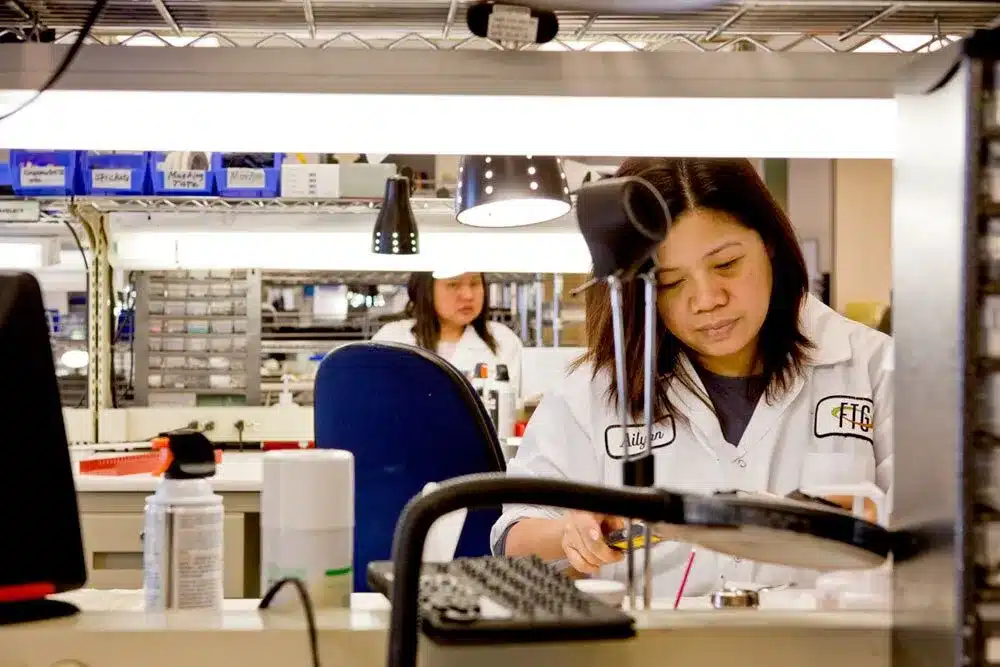Is the Harper Government Spaced out on Technology?

Two years ago, on a tour of Canada’s North, Prime Minister Stephen Harper underlined his support for Canada’s much admired Radarsat satellite system by pointing out the detail with which the technology can help guard borders by providing visual resolution high enough to spot small objects, such as an oil container.
Today, with Radarsat’s primary contractor MacDonald Dettwiler facing further layoffs because of government cutbacks to Radarsat funding, it appears Harper’s inaction on technology is throwing oil on the fire.
On March 30th, a day after the Canadian federal budget was released, Macdonald Dettwiler (TSX:MDA) issued a press release, plaintively stating the company “has concluded that the budget does not include the funds required to continue the RADARSAT constellation mission (RCM) as currently envisioned.”
_____________________________________________________________________________________________________________________
This story is brought to you by Serenic (TSXV:SER). Serenic’s market cap of $3.18 million (as of January 27th, 2012) was less than its cash position of $4.03 million (as of Q2, 2012). The company has no debt. Click here for more information.
______________________________________________________________________________________________________________________
In that budget, it was revealed that The Canadian Space Agency will need to cut its budget by $7.9-million in 2012-13 and $24.7-million in 2013-2014.
This past Friday, MDA spokeperson Wendy Keyzer said the company has lost a hundred employees and could lose 150 more because of a lack of funding.
Former astronaut Marc Garneau, who is now a Liberal MP for Westmount/Ville-Marie is puzzled by the sudden lack of funding for the program, telling the Vancouver Sun’s Tracy Sherlock recently: “…they did not say when [it will continue] or provide any specifics,” adding: “This is a program that I started seven years ago, I don’t see why suddenly, after the detailed design phase is nearing completion and it’s time to build it, there seems to be a hiccup.”
The Harper government’s idling around Radarsat is doubly puzzling when one considers that, 2008, it blocked the proposed sale of the company’s space division to US-based Alliant Techsystems. The move was the first time in the twenty-three year history of the Investment Canada Act that the federal government blocked a foreign takeover because of a failure of the “net benefit” test.
The Radarsat fiasco would appear to contradict Harper’s words at the World Economic Forum in Davos this past January where he said his government would renew its commitment to technology.
“In the months to come our government will undertake major transformations to position Canada for growth over the next generation.” said Harper, adding: “We will continue to make the investments in science and technology necessary to sustain a modern competitive economy. But we believe that Canada’s less than optimal results for those investments is a significant problem for our country. We have recently received a report on this, the Jenkins report, and we will soon act on the problems the report identifies.”
The Jenkins Report, the informal name for The Review of Federal Support to Research and Development, was produced by a panel led by Open Text Chairman Tom Jenkins. Among the recommendations of the the report, which was submitted to Gary Goodyear, the Canadian Minister of State for Science and Technology in late-October, are that the Scientific Research and Experimental Development Tax Incentive Program (SR&ED or SRED), be overhauled, the National Research Council should be turned into a number of large-scale collaborative centers, and that the Business Development Bank of Canada should work more closely with angel investor groups.
Jenkin’s peer, Ottawa telecom legend Terry Matthews, says there is a perception that Canada’s is outperforming the rest of the world, but the evidence suggests we actually lagging.
Matthews investment firm, Wesley Clover, recently released a white paper called The Challenge of Survival for Canada’s Technology Sectors. The paper warns “we cannot rely on the export of oils gas minerals, grain and wood alone” The document also sets to dispel what it believes to be a commonly accepted fallacy; that Canada got through the recession unscathed and is a model for the world.
“If that is true”, the paper asks, “Why were we only 13th of 34 in the Organisation for Economic Co-operation and Development for real GDP growth in 2010?” adding “Why were we twenty-first in unemployment rate in the OECD for 2009 and still just 17th by 2010?”. The reality, says the report, is that we are “in the middle of the pack.”
MacDonald Dettwiler has been a part of the fabric of Canadian technology since 1969, when John MacDonald and Werner Dettwiler formed their eponymous venture. For much of its life, the Richmond, BC based company was probably best known for its contribution to the Canadarm (through its acquisition of Spar Aerospace), a robotic space arm developed in the 1970’s to repair and service NASA space shuttles. Radarsat-1, which was launched by The Canada Space Agency in 1995, was Canada’s first commercial Earth observation satellite. Its successor, RADARSAT-2, now accounts for nearly 40% of MDA’s total revenue.
_______________________________________________________________________________________________________________________
______________________________________________________________________________________________________________________
Nick Waddell
Founder of Cantech Letter
Cantech Letter founder and editor Nick Waddell has lived in five Canadian provinces and is proud of his country's often overlooked contributions to the world of science and technology. Waddell takes a regular shift on the Canadian media circuit, making appearances on CTV, CBC and BNN, and contributing to publications such as Canadian Business and Business Insider.


